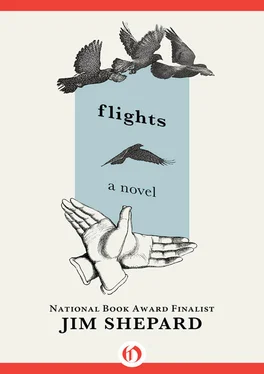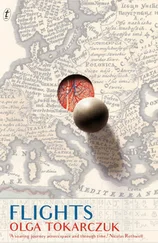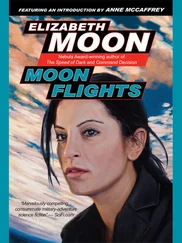“Be seated,” Father said. “A reading from the Holy Gospel according to Luke.”
“Glory to you, O Lord.”
He shifted at the podium, and began.
“Now it came to pass in those days that a decree went forth from Caesar Augustus that a census of the whole world be taken. This first census took place while Cyrinus was governor of Syria. And all were going, each to his own town, to register. And Joseph also went from Galilee out of the town of Nazareth into Judea to the town of David, which is called Bethlehem, because he was of the house and family of David, to register, together with Mary his espoused wife, who was with child.
“And it came to pass while they were there that the days for her to be delivered were fulfilled. And she brought forth her firstborn son and wrapped him in swaddling clothes and laid him in a manger, because there was no room for them at the inn.
“And there were shepherds in the same district living in the fields and keeping watch over their flocks by night. And behold, an angel of the Lord stood by them, and the glory of God shone round them, and they were much afraid.
“And the angel said unto them: ‘Fear not, for behold, I bring you tidings of great joy, which shall be unto all people, for today in the town of David a saviour has been born to you, who is Christ the Lord.’…
“And suddenly there was with the angel a multitude of the heavenly host, praising God and saying, ‘Glory to God in the highest, and on earth peace to men of good will.’”
Father closed the book with a quiet slap. “This is the Word of the Lord.”
Biddy sat transfixed, murmuring with the rest, “Thanks be to God.”
The Homily went by unnoticed, an uneven drift of words in the distance. His mind stayed out with the flocks in the darkness under the ancient night sky, with the shepherds and stars and angel who spoke so beautifully that to his complete surprise the Gospel, of all things, had provided something as vivid as the Orioles or the Vikings and a rough hillside thousands of miles and years away had become as familiar and comforting as Three Rivers Stadium or the Oriole dugout.
It was not a moment to rush through. He stood for the Profession of Faith a second later than the others, the first moment he was aware of when the choir was not in complete synchronization.
And as he recited, he did believe: in one God, the Father, Almighty, Maker of heaven and earth, of all that is seen and unseen. In Jesus, in his crucifixion, in the rest of the prayer, which grew progressively harder to keep concrete, to keep meaningful, until, as always, he felt even in his faith a lack of faith, a nagging conviction that he didn’t believe hard enough.
Father had begun the Liturgy of the Eucharist and was preparing the host: “The day before he suffered, he took bread in his sacred hands, and looking up to heaven to you, his Almighty Father, he gave you thanks and praise. He broke the bread, gave it to his disciples, and said: ‘Take this, all of you, and eat it: this is my body which will be given up for you.’” Biddy knelt without moving, lost in thought, and found himself mouthing along: “When the supper was ended, he took the cup. Again he gave you thanks and praise, gave the cup to his disciples, and said: ‘Take this, all of you, and drink from it: this is the cup of my blood, the blood of the new and everlasting covenant. It will be shed for you and for all men so that sins may be forgiven. Do this in memory of me.’”
He sat back, wishing he could understand, as Father rang the prayer to a close. Upon the final lines the choir stood together, relieved and moved, bored and distracted, to sing the answering Amen.
The Our Father followed. They gave each other the Sign of Peace. Down the bench Teddy farted, trying to muffle it. Father said, “This is the Lamb of God, who takes away the sins of the world,” and Biddy, hoping somehow that it would help and knowing that he was wholeheartedly sincere in at least this prayer, said, “Lord, I am not worthy to receive you, but only say the word and my soul shall be healed.”
They sang “Silent Night” while the congregation received Communion. When the song was finished and the choir filed out of the pews to receive as well, the congregation, unsure of its new singing responsibilities with the addition of a choir, began haltingly to start a new verse before petering out and leaving only the shifting sounds in the pews to accompany the quiet dialogue between celebrant and communicant, not quite lost in the hush: “ … The Body of Christ. … Amen.” His mouth full of the dry tasteless wafer, he sat down, his eyes closed until the saliva could break it down.
There were more prayers, and suddenly they were all standing for the concluding blessing. Father said, “The Lord be with you,” and the response was the most wholehearted, the most enthusiastic of the Mass, as it always was: “And also with you.” “The Mass is ended. Go in Peace.” “Thanks be to God.” And Sister looked at them over her shoulder from the organ and nodded as her hands began “Hark! the Herald Angels Sing.”
Biddy sang. He sang as he never had before and perhaps never would again, realizing the song had always been his favorite, realizing it to be the perfect song with its power and joy to appear here to end the ceremony, to send them out into the snow and Christmas: “Joyful, all ye nations rise, join the triumph of the skies, with the angelic host proclaim, ‘Christ is born in Bethlehem!’ Hark! the herald angels sing, ‘Glory to the newborn King!’”
There was another chorus but the congregation thundered into the aisles, leaving only the choir and Sister to appreciate it. And with small knots of parents remaining, clustered at the main doors, they sang the final notes and turned to one another in exhilaration, grinning and clapping congratulatory hands on shoulders.
Sister stood away from the organ and said, “You were just wonderful. Merry Christmas to you all. I’m proud of you.”
Their ranks broke with a whoop, and he wished them all Merry Christmas — Sarah Alice, Teddy, Janet — trying to catch them before they disappeared into the chaos. Laura hugged him. She wished him a Merry Christmas and swept down the central aisle to her parents, leaning forward with their arms out at the main doors.
They found him still at his seat: his mother, Rose, Sandy, and Michael. The altar boys were moving swiftly back and forth extinguishing candles, anxious to get home. “You were wonderful,” his mother said. “Did you see us over on the left?” He hadn’t. Everyone agreed the choir had been marvelous. Rose kissed his cheek, a glancing blow, and it occurred to him she was happy her talk had turned him around. His mother asked what they were waiting for.
“I’ll be right there,” he said. “I just want to do something.”
She offered to wait but he said he wanted to talk to Father. They said they’d go on ahead in that case, and left, wrapping coats and mufflers around themselves and hunching forward as they passed through the main doors. Michael brought the car around for Rose. Biddy could see the snow coming down beyond. A noise from the sacristy intruded, and he turned and slipped into the second choir pew. He lay back along the bench seat gazing up at the ceiling beams brightly lit from below. He could hear odd metallic and wooden noises, as well as the rustle of Father’s chasuble as he bustled around the church preparing to leave. When the noise grew very close, he knew Father was taking a last look in the chapel, and suddenly the lights went out, leaving only the glow from the sacristy coming over the horizon of pews like a yellow sunset. When the door shut, the light disappeared, leaving him in darkness. He imagined he could hear the snow piling up outside. An outer door swung shut with a much heavier sound, and he sat up.
Читать дальше












